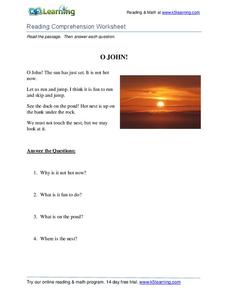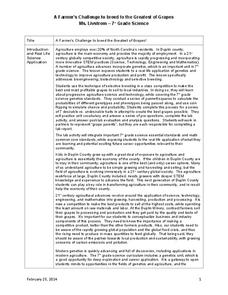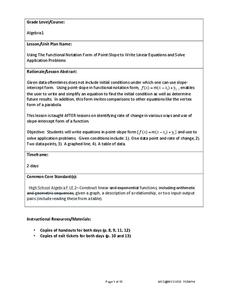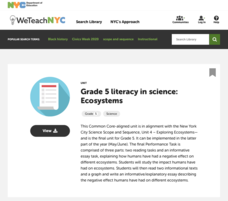Teach Engineering
Who Can Make the Best Coordinate System?
Working with a map that does not have a coordinate system on it, small, collaborative teams must come up with a coordinate system for their map. Groups then explain their coordinate structure to the class.
Curated OER
Osmosis and Dialysis
How do you engage pupils in a discussion about osmosis without leaving them overwhelmed? By providing them with the tools to perform an exciting experiment, and they will see osmosis in action! Young chemists and biologists use...
K5 Learning
O John!
As the sun sets, what does the narrator see? After reading brief passage, first graders answer four comprehension questions about what they read.
K12 Reader
Taiga Ecosystems
Introduce your class to another type of ecosystem, the taiga ecosystem, through a reading passage. Class members read the text and then respond to five reading questions about the content of the passage.
University of Texas
What Are Calories?
What are calories, and how do calorie needs differ from person to person? Here is a activity that briefly explains how calories measure the energy supplied by food, as well as suggests the amount of food an individual should eat per day.
Museum of Tolerance
Why is This True?
Are wages based on race? On gender? Class members research wages for workers according to race and gender, create graphs and charts of their data, and compute differences by percentages. They then share their findings with adults and...
Chicago Botanic Garden
Unit 2 Pre-test, Grades 7– 9
This pre-assessment launches a unit on climate change and weather. 15 questions, both short answer and multiple choice, asses the classes' knowledge about these concepts.
K5 Learning
Landforms
Valleys, mountains, and plateaus are just a few geographic landforms on our Earth. Read about these types and more in a brief landform passage. After reading, learners respond to six short answer comprehension questions.
K5 Learning
Pretty Fish
John caught a trout, but will he release it or eat it? After reading the passage, young readers respond to four comprehension questions about the story.
K5 Learning
A Big, White Hen
Why wouldn't the chickens cross the brook? Find out in a short reading passage about a mother hen and her babies' daily walk. Second graders answer four comprehension questions after they finish reading the story.
University of Southern California
Human Impact on the Sea
How far does the human hand reach? Five interactive lessons lead classes through a unit exploring the human impact on ocean resources, pollution, and even extinction. Learners discover how their decisions affect the ocean...
Kenan Fellows
A Farmer’s Challenge to Breed to the Greatest of Grapes
What does your class know about GMOs? Are they savvy to selective breeding? Challenge young minds to engineer the greatest crop of all time using a hands-on genetics unit. Learners discover the good and bad details of selective breeding,...
Reed Novel Studies
Third Grade Angels: Novel Study
A million things to do, a ton of homework ... hyperbole sure does help get the point across! With the novel study for Jerry Spinelli's Third Grade Angels, scholars practice writing their own exaggerated sentences. Additionally, they...
PBS
“He Named Me Malala”: Understanding Student Activism Through Film
Malala Yousafzai has become the face of social activism. After watching He Named Me Malala and short student-made films about what young people can do to become instruments of change, class members reflect on what it means to be an...
West Contra Costa Unified School District
Point-Slope Application Problems
Create a linear equation for a problem when the intercept information is not given. The two-day lesson introduces the class to the point-slope form, which can be used for problems when the initial conditions are not provided. Pupils...
Do2Learn
Communication Board
Help nonverbal individuals navigate a very verbal world with a helpful communication board. After they fill in their name to introduce themselves to others, learners can point to written responses to yes or no questions, as well as...
Teach Engineering
Bone Density Math and Logarithm Introduction
What do logarithms have to do with bone density? Scholars learn that the equation for bone density includes logarithms. The majority of the third instructional activity of seven is devoted to logarithms and their properties.
Global Oneness Project
Rethinking the Fabrics We Wear
What are fibersheds and what what do they have to do with environmental protections? A photo essay and audio recordings about Mimi Luebbermann, and her sheep, cause consumers to reflect on how their clothing choices can support local...
Appalachian State University
The Fault in Our Stars: A Movie Study Guide for Eighth Grade Language Arts, Social Studies, and Science
How would you spend your last days with a loved one? The movie guide for The Fault in Our Stars prompts scholars to compare important scenes from the novel to the film and contains background information about the author, guided...
New York City Department of Education
Grade 5 Literacy in Science: Ecosytems
How do humans affect ecosystems? Learners read two articles and interpret a graph to develop essays on the human impact on ecosystems. They read about human impact on tigers and manatees as a basis for their overarching papers.
Virginia Polytechnic Institute and State University
Lesson Plan: Successful Microwave Cooking
No need to be involved in a home economics or cooking courses to take advantage of this resource. Not only is there an explanation for how microwaves work but there are also tips for how to use the microwave, and cautions...
Charleston School District
Scientific Notation Operations
How do you operate with numbers in scientific notation? The resource provides examples on how to divide and multiply with numbers written in scientific notation. The handout and video also cover the procedure for addition and subtraction...
Mathematics Assessment Project
100 People
It's a small world after all. In the middle school assessment task, learners use data that imagines there are only 100 people in the world to answer questions about population demographics. Young mathematicians use ratio and proportional...
Mountain View High School
World War I Research Project
Here is a fantastic World War I research project that includes clear guidelines for topic choice, guiding questions, and suggested presentation products. Research subjects range from battles of the war, trench warfare, and weaponry, to...

























